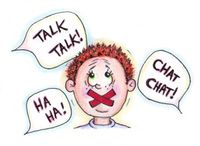Muteness
“I watched that documentary on those poor mute people, honestly, it’s the first time I’ve ever been left speechless”
– Captain Inappropriate on A documentary about Muteness
“She didn’t say the safety word so I kept going, I just thought she liked it”
– a man on trial for the rape of a mute
“..... ... ...”
– A mute person being angry about the above use of their disability in a comical environment
Muteness is the inability to speak, and those who are affected by it are called ‘mutants’. Sometimes this is to avoid awkward conversations with their uncle Barry, others are genuinely unable to speak. Seriously. Even the simplest task like buying a porno mag becomes hard to do without pointing to it in the newsagent and making the ‘wanker’ sign at the foreigner behind the counter.
Some people have anxiety disorders that mean they are unable to speak around some people, but they can speak around certain people. Opinion is divided between if this is caused by a physical characteristic of the brain, or if these people are simply socially retarded. ‘selective mutism’ to the politically correct, is not the same as stage fright, or ‘choking’ if you are an MC. Selective mutes could have a problem with talking in front of big groups, on the radio or most, in front of someone they want to nail, or someone who is about to kick the shit out of them. It's also not the same as stammering, as at-least the mutants can keep their mouths shut and generally not bother us that much with their inability to communicate.
What Causes Selective Mutism?[edit | edit source]
Most selective mutants are so because of underlying problems like dyslexia, and bad parenting. Usually if someone develops the inability to talk to somebody else, it’s due to a traumatising experience that happened during their early development years. Selective mutism can develop after traumatic events like having your banjo strummed by your uncle Barry during your 6th birthday party, which was topped off, when your best mate Jimmy didn’t turn up. For example. Obviously there are other ways in which selective mutism develops, but those are just excuses.
History[edit | edit source]
In the ancient past mutes were believed to have been chosen by God to be His silent monks. Because of this they were treated by the rest of society as upper class citizens for serving God through religious silence. When doctors realised that their silence was not a voluntary act of religious devotion, but a life limiting condition, mutes were slated for not coming clean and saying so in the first place. This led to mutes being considered second class citizens, somewhere between ginger and black people. And no, that’s not racist because this is the history section so I can pretty much say whatever the fuck I like and blame my ancestors for it. And besides, they don’t have souls, so ginger people aren’t a race.
Why You Shouldn’t Make Fun of the Vocally Retarded *AHEM* Mutants **AHEM** "Vocally Challenged"[edit | edit source]
In modern society it is considered taboo if you are not politically correct in the way you talk to mute people. The politically correct version of the ‘Would You Rather’ question, “Would you rather be blind or deaf”, is now, “Would you rather be blind, deaf or mute”. This makes the ultimatum pointless, because being classed as disabled for not being able to talk is like being morbidly obese; you’re not really disabled but you’re receiving benefit money for it. At the end of the day, you’d always choose to be mute because if you were deaf, chances are it would be from birth, and you’d never have heard people talking for you to imitate, therefore, any control over your vocal cords would be similar to that of a feral child. So, if you were deaf you’d most likely be mute too. Being blind is obviously a lot worse than being mute, when it comes down to it not being able to talk is no where near as embarrassing as facing the wrong way during entire conversations.



